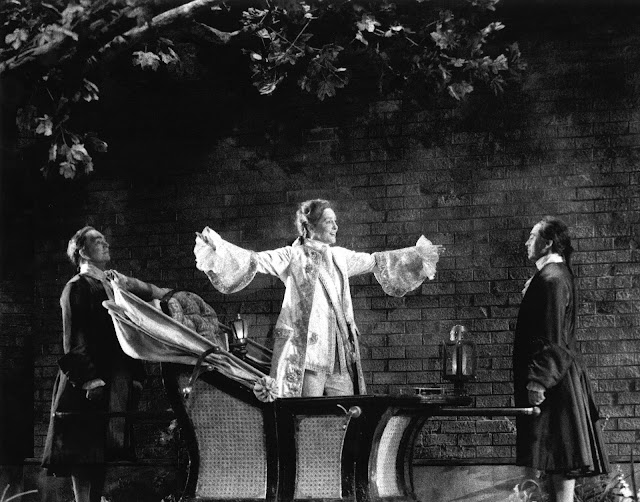Longtime Seattle Opera supernumerary reaches 100th production
 |
| Luther Hintz backstage at Seattle Opera's 1998 production of Tristan and Isolde. Courtesy of Luther Hintz. |
Luther Hintz has seen more shows at Seattle Opera than just about anyone else in the world. And he’s had a unique vantage point: a view from the stage. Luther is a supernumerary—an extra, in opera parlance. Supernumeraries (or “supers,” for short) don’t sing, but they do get dressed up in costume to play the roles of townsfolk, soldiers, servants, or anything else needed to complete an opera scene. This summer’s production of The Elixir of Love marks Luther’s 100th production with Seattle Opera—a major milestone in a relationship stretching back nearly 40 years.
In a pre-show presentation on Sunday, August 7, General Director Christina Scheppelmann presented Luther with an award in recognition of his 100th production as a supernumerary with Seattle Opera. Video credit: Jeffrey Parker.
Luther, a retired architect who moved to Seattle in the early 1980s, first appeared as a super with Seattle Opera in 1986 for Giacomo Puccini’s Tosca. He decided to join after chaperoning for his seven-year-old daughter when she played a Nibelung in The Ring the previous year. Father and daughter had so much fun on stage that they eventually appeared in half a dozen productions together. Luther was hooked.
The thrill of sharing the stage with some of the world’s greatest singers is what kept Luther coming back. “When you start rehearsing, you are aware of the fact that these people have a tremendous gift and it's amazing what they can do with their voices,” says Luther, who always wears his tuxedo to the opera house on opening night. “I get goosebumps when I think of being on stage with somebody with that kind of talent, linking arms or standing right next to each other.”
 |
| Backstage at The Elixir of Love, Luther Hintz shows off his award in recognition of his 100th production as a supernumerary with Seattle Opera. Photo credit: Jeffrey Parker. |
Supernumeraries are volunteer positions, and the demands can vary wildly from production to production. Some shows ask their supers to stand motionless for hours on end, leading to the perception among some stage directors that supers are little more than “movable furniture,” says Hintz. In other productions, supers are asked to mill about, shout, laugh, or even dance.
In rare productions, however, supers get the chance to take center stage. Giacomo Puccini’s comedy Gianni Schicchi, which Seattle Opera produced in 1990, opens with the character Buoso Donati, played by a super, on his death bed. Donati’s death kickstarts the opera, putting all eyes on him. For Luther, it was one of the most thrilling moments of his career. “The conductor told me, ‘I will get the orchestra ready, and then I'll point at you. And when you’re ready, we’ll start.’ And I had to start the opera by groaning and screaming, then dying. It was amazing, to act in front of 3,000 people.”
The proximity to well-known singers occasionally leads to once-in-a-lifetime interactions. In that pivotal production of Gianni Schicchi, longtime Seattle Opera bass-baritone Archie Drake liked to squirt Luther with seltzer, attempting to get him to break character. “He tried to make me laugh when I was supposed to be dead! It was great, it was so much fun.”
In Seattle Opera’s 1997 production of George Frideric Handel’s Xerxes, Luther appeared alongside beloved mezzo-soprano Frederica von Stade in her only appearance at Seattle Opera. “Another super and I, we carried her in a sedan chair. She was so nice to us and she was world famous. She was just so gracious, and she didn’t have to be. She gave us coffee mugs at the end of the production!”
In rare productions, however, supers get the chance to take center stage. Giacomo Puccini’s comedy Gianni Schicchi, which Seattle Opera produced in 1990, opens with the character Buoso Donati, played by a super, on his death bed. Donati’s death kickstarts the opera, putting all eyes on him. For Luther, it was one of the most thrilling moments of his career. “The conductor told me, ‘I will get the orchestra ready, and then I'll point at you. And when you’re ready, we’ll start.’ And I had to start the opera by groaning and screaming, then dying. It was amazing, to act in front of 3,000 people.”
 |
| Luther Hintz (left) with Frederica von Stade (center) in Seattle Opera's 1997 production of George Frideric Handel's Xerxes. Photo credit: Luke Jefferee. |
In Seattle Opera’s 1997 production of George Frideric Handel’s Xerxes, Luther appeared alongside beloved mezzo-soprano Frederica von Stade in her only appearance at Seattle Opera. “Another super and I, we carried her in a sedan chair. She was so nice to us and she was world famous. She was just so gracious, and she didn’t have to be. She gave us coffee mugs at the end of the production!”
 |
| Luther Hintz (center right) and Seattle Opera company manager Paula Podemski (center left) backstage at Boris Godunov in 2000. Courtesy of Bill Mohn. |
But his favorite opera is Gaetano Donizetti’s Lucia di Lammermoor, which he has appeared in three times at Seattle Opera. “I just love that music,” says Luther. It’s precisely what has kept him going for all these years—the joy of music and the power of the unamplified human voice, mixed with the singular exhilaration of live performance.
Thank you, Luther, for your service to Seattle Opera. Here’s to many more productions to come!
See Luther in action in The Elixir of Love, running now through August 20 at McCaw Hall. Tickets and info at seattleopera.org/elixir.
.png)



No comments:
Post a Comment